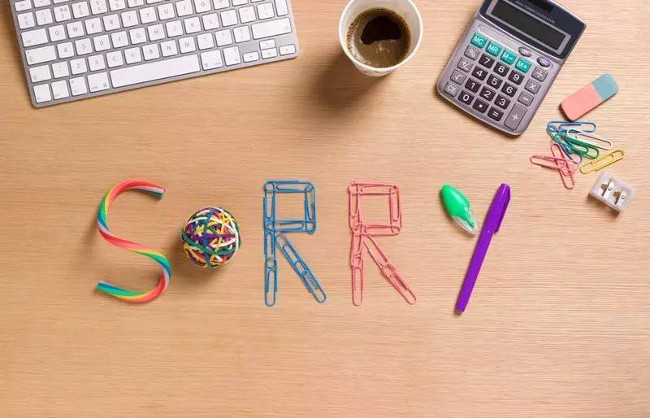Say 'Thank you' instead of 'Sorry' when doing something wrong
Courtesy has been ingrained in the subconscious of all of us - even more in some other cultures.However, it is a common behavioral model used to make sure that others understand that we do not intend to harm them, and are always concerned about the needs of others, showing sympathy for those around.
The words " sorry " have become an automatic courtesy in today's communication. However, do we understand the true meaning of apologizing? We apologize to show that we have done something wrong but have no bad intentions. We apologize for making others unhappy or sometimes we use apology as a means of dispelling disagreement.

Don't get me wrong, the apology has its own meaning and effect to use on a case-by-case basis in everyday life, such as when you accidentally hit someone, show sympathy or let others see you expressing your guilt about a mistake. But in certain situations, there is still a better way to say sorry, not only to meet your need to say sorry, but also to help others feel better.
Saying apology is important but it has its own place
" Sorry " can be listed in the list of polite words like " thank you ". However, by apologizing, we expose our weaknesses, inadvertently lowering our self-worth and reducing confidence in cases of error due to objective circumstances.
For example, in case if you go to meet a friend half an hour late, by saying "sorry" you are exposing your mistakes ( in this case, lack of punctuality ). In return, instead of saying sorry to yourself waste your time, it also shows that you are a person who cannot manage time.

The power of "thank you"
"Thank you" is often used to express gratitude and respect for others. It is a powerful phrase that can bring warmth to those around you. The respect that we show and the ability to say sincere thanks has a great impact on our relationship with people.
Meanwhile, apology is seen as the right way to react when we do something wrong , which leads to the assumption that others will appreciate our polite behavior, but since the apology Being abused too much, it can become an empty and meaningless statement.
"Thanks and sorry"

By saying thank you, show that you value other people's contributions . As the example above, when you are half an hour late in your appointment with your friend, say a thank you instead of apologizing to show respect for the time your friend has given you. This does not diminish your image or what the person thinks of you but instead praises what they have done for you.
" Thank you for your patience " shows respect, while saying " Sorry for being late " does not show gratitude to someone who has been waiting for you.
" Thank you for listening to me " it would be better to say " Sorry to keep talking " because of that, you show respect for your friend's time, not admitting that he is not important enough to Someone spends time with.
" Thank you for spending your time " instead of " Sorry for losing your time " this is also a way to appreciate others and appreciate yourself.
So if you really want to say sorry to someone sincerely after doing something to them. Give compliments when saying "thank you" to fit the situation and even give a high opinion about how someone has spent time with you by showing what that means. with you. In fact, saying sorry is easy for us and meanwhile we cannot understand it wholeheartedly and it seems to be just a correct and polite response to use in that case. By using this method, we unintentionally took our assessment of them.
By recognizing other people's emotions and acknowledging them, you are praising their actions and making them see you more positively. Of course, not everyone is perfect, doesn't make mistakes, so sometimes we may accidentally do things that damage others, so if the next time falls into such a situation, remember to the power of " thank you "!
Refer to some more articles:
- 12 lessons about happiness I learned in the most difficult situation
- 4 reasons to immediately remove the word "sorry" in your vocabulary
- 5 ways to refuse do not offend others
Having fun!
You should read it
- ★ Understanding the meaning of these 7 words, we will live very happily
- ★ The reason should immediately remove the words 'But' and 'I have to' from your life
- ★ Do you believe that only 15 words will make listeners lose faith in life?
- ★ How different is knowledge, wisdom and insight?
- ★ 34 profound statements about life